We recently saw Alaska Airlines and Hawaiian Airlines launch their new combined loyalty program, Atmos Rewards. The program is really well designed, and I find it to be incredibly engaging. It’s so well thought out that I’m very close to pulling the trigger on switching from American AAdvantage to Atmos Rewardds, even though I rarely fly Alaska.
Let me explain my logic, as I’ve had a countless number of people who usually fly American ask me if there’s merit to switching to Atmos Rewards.
In this post:
Why I’m tempted by the Atmos Rewards program
Big picture, and before getting into the details, let me explain why I’m considering a switch to Atmos Rewards. I’d like to think that I’m a relatively rational consumer when it comes to the value that airline loyalty programs can offer.
Over the years, what I value from airline elite status has changed. Back in the day, complimentary domestic upgrades was the perk that made me pursue elite status. Nowadays upgrades are so hard to come by that I don’t value that nearly as much.
For context, I had American AAdvantage Executive Platinum status for 14 years, and I finally dropped down last year. My strategy was going to be to pursue AAdvantage Platinum Pro status this year primarily through a combination of credit card spending and crediting flights to the program.
Why did I even want to pursue Platinum Pro? A simple reason — I really value oneworld Emerald status, and Platinum Pro is the lowest elite tier that gets you that. This status offers valuable benefits across oneworld airlines, including access to incredible oneworld Emerald first class lounges.

The thing is, I kind of struggle with actually bringing myself to spend money on American’s co-branded credit cards. Why? Well, there’s quite an opportunity cost to doing so, since none of American’s cards have a terribly compelling return on spending, beyond the Loyalty Points you rack up.
Most cards earn 1x AAdvantage miles per dollar spent in most categories. At a minimum, I could earn 2x AAdvantage miles per dollar spent by instead using a Citi ThankYou card, like a combination of the Citi Strata Elite℠ Card (review) and Citi Double Cash® Card (review). So the opportunity cost is pretty direct.
Ultimately I’m okay with this opportunity cost. Still, in an ideal world, I’d be able to have my credit card spending count toward elite status without feeling like there’s an opportunity cost to that spending. This is where I feel like Atmos Rewards was the answer to my miles & points prayers, because based on how I’ve mapped this out, I could earn oneworld Emerald status with zero opportunity cost.
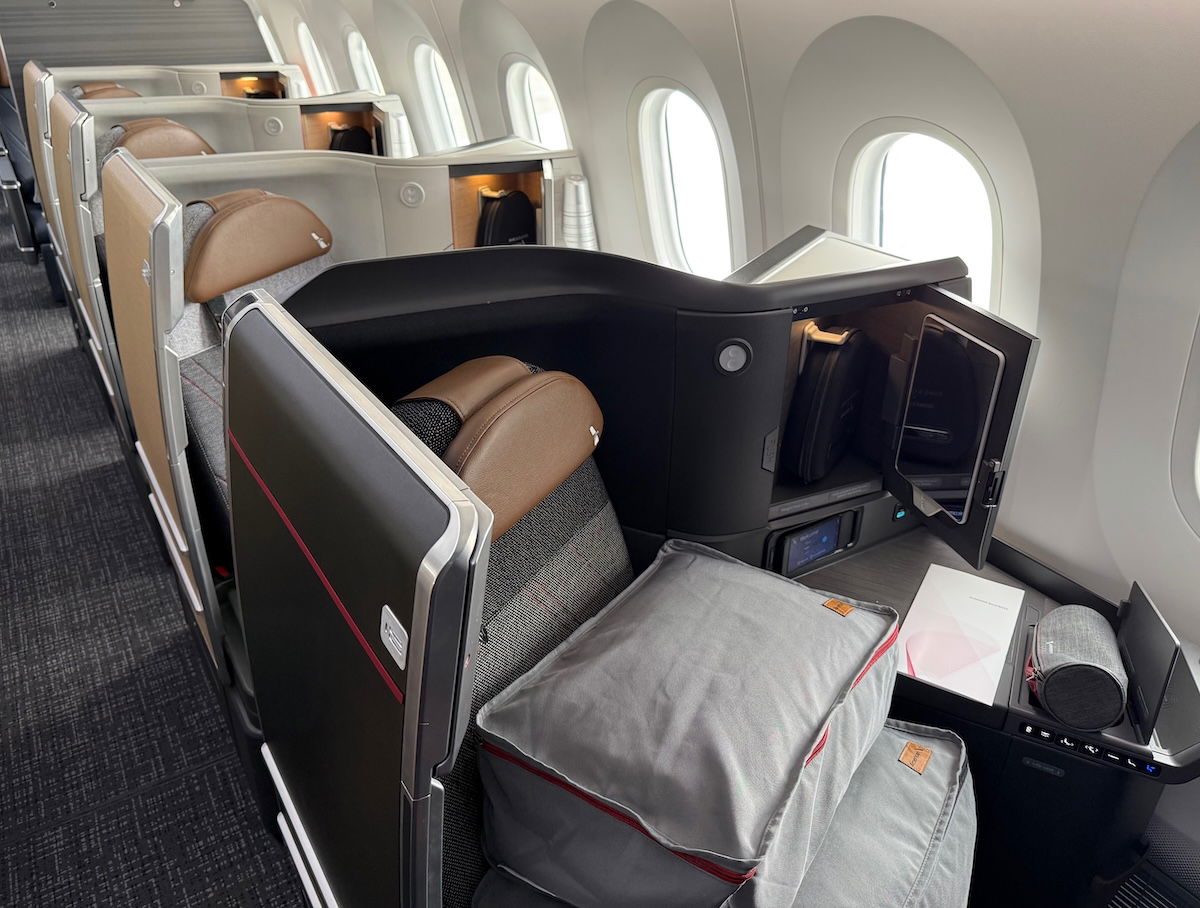
My strategy for earning Atmos Rewards elite status
Before I explain my Atmos Rewards strategy, let me recap the Atmos Rewards elite tiers, and how they map over with oneworld elite status:
- Atmos Silver (oneworld Ruby) requires 20,000 status points
- Atmos Gold (oneworld Sapphire) requires 40,000 status points
- Atmos Platinum (oneworld Emerald) requires 80,000 status points
- Atmos Titanium (oneworld Emerald) requires 135,000 status points
There are two primary aspects to my strategy of earning elite status — credit card spending and award flights. Yes, I’d earn some points for flights on revenue flights, and I’ll cover that as well, but it’s not even a core part of the strategy.
Earning Atmos Rewards status points with credit cards
A large part of my strategy with Atmos Rewards involves the newly launched $395 annual fee Atmos™ Rewards Summit Visa Infinite® Credit Card (review), which is one of the best airline credit cards we’ve ever seen. Just to recap the very basics:
- The card offers 3x points on all foreign spending, as well as 3x points on dining
- If you have a Bank of America account, you earn a 10% relationship bonus, so you earn 3.3x points on foreign spending and dining
- If you spend $60,000 on the card in an anniversary year, you earn a 100,000-point Global Companion Award
- The card lets you pay your rent with Bilt for a 3% fee, and then you earn 3x points on that spending (on up to $50,000 of spending per year)
- The card offers one status point for every $2 spent, and starting on the first account anniversary, the card offers an annual boost of 10,000 status points
To be exceptionally conservative here, I’d earn 40,000 status points per year from the card. That’s because there’s the annual boost of 10,000 status points, and I’d also want to spend at least $60,000 to earn the 100,000-point Global Companion Award.
What makes me giddy about that is that I could reach virtually all of that spending with zero opportunity cost whatsoever. This would be the best card to use for these purchases, even if status weren’t a factor.
I actually think I’d earn materially more status points than that, but that’s intended to be a conservative estimate. Those 40,000 status points would get me halfway to oneworld Emerald.
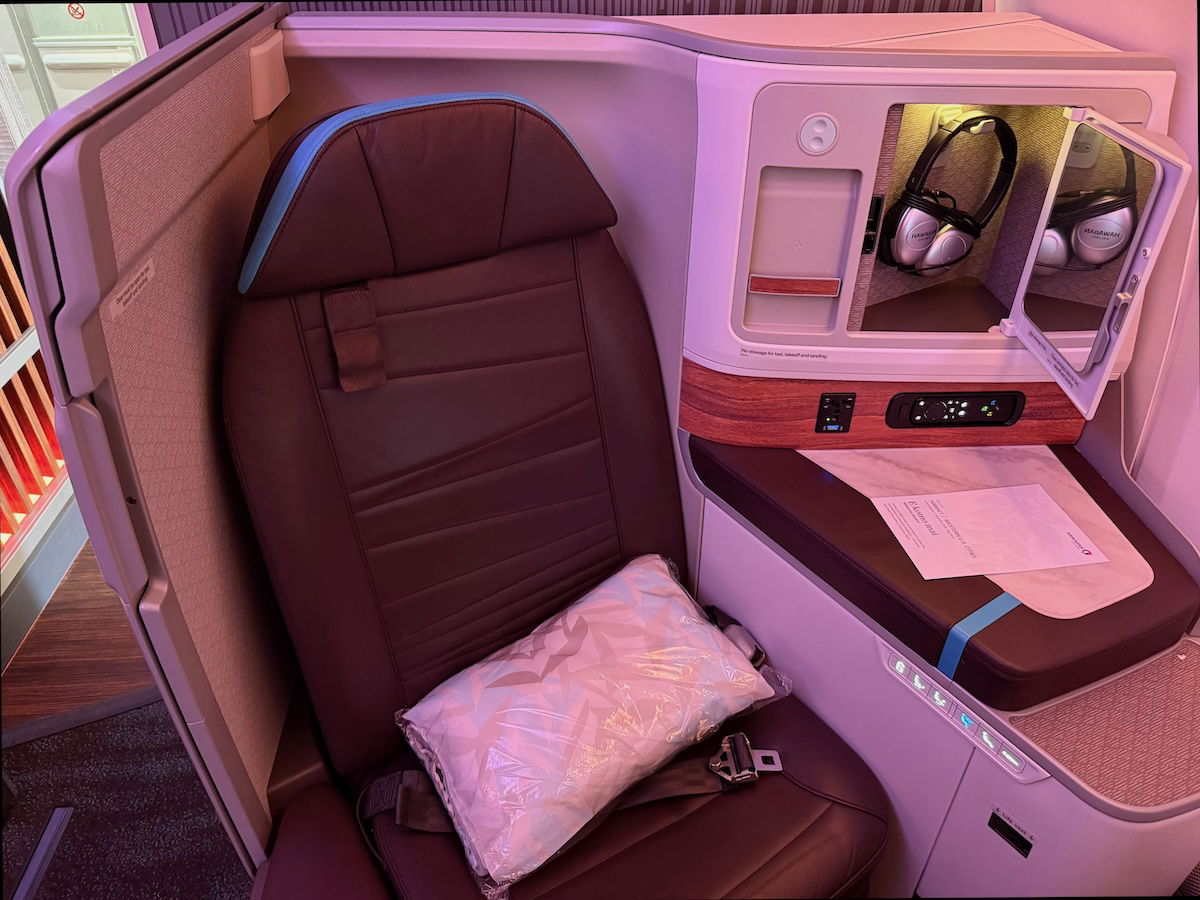
Earning Atmos Rewards status points with award flights
The Atmos Rewards program offers one status point per flown mile on an award ticket, assuming you choose to earn status points based on distance flown (which I would). This is such an awesome aspect of the program, given all the great uses there are of Atmos Rewards points.
The truth is that I use Atmos Rewards points all the time for award flights on American, which are just practical. If there’s saver level award availability, Atmos Rewards almost always has better pricing, and that says nothing of those award flights counting toward elite status.
Like, take the below award between Miami and London in business class, which costs 55,000 points through Atmos Rewards, or 80,000 miles through AAdvantage.


Or take the below award between Miami and Tampa in economy or first class, which costs 4,500 points or 9,000 points through Atmos Rewards, or 7,000 miles or 15,000 miles through AAdvantage.


For example, this year I’ve actively been trying to avoid redeeming Atmos Rewards points (simply because I have such a sizable balance of American AAdvantage miles), but I’ve already earned over 17,000 status points.
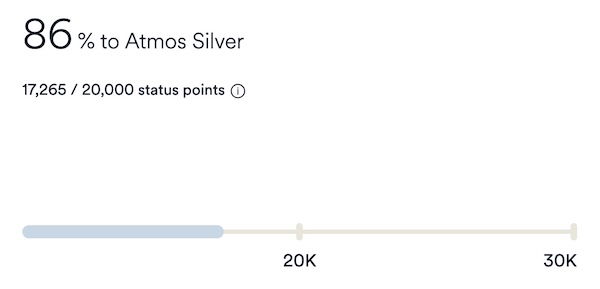
If I actually redeemed more consistently through Atmos Rewards, I have to imagine that I’d easily earn 40,000 status points per year that way, which would literally get me all the way to oneworld Emerald. Easy enough, eh?
Some people may wonder “well can you generate enough Atmos Rewards points to keep funding those award flights?” Honestly, I have very good luck finding award space on American with partner points currencies, and worst case scenario, I’ll buy Atmos Rewards points when they’re on sale.
During a sale, you can buy points for well under two cents each. First class from Miami to Chicago or New York costs 15,000 points, so that’s like paying under $300 — I’d consider that to be a deal!
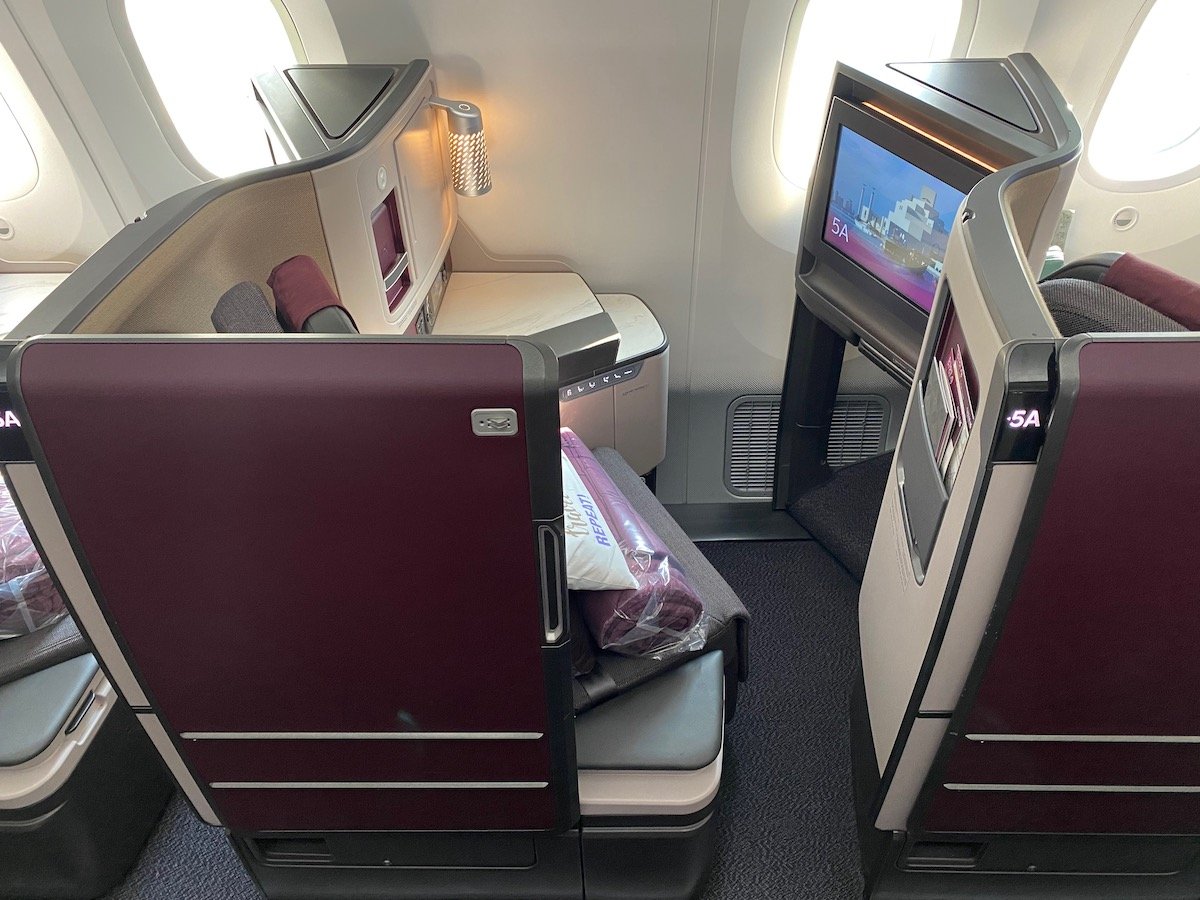
Earning Atmos Rewards status points with revenue flights
If you credit revenue flying to Atmos Rewards, how lucrative is that? It’s extremely rewarding if you’re traveling on Alaska or Hawaiian, or if you’re booking through Alaska. Maybe I should fly Alaska and Hawaiian more, though I often find few opportunities to book partner flights through Alaska at a competitive cost.
Unfortunately it’s the other situations — where you book partner flights directly through partner airlines — where it’s a bit less rewarding.
As you can see below, if not booking through Alaska, the rates aren’t necessarily that great. You’re looking at earning miles equal to 25-50% of the distance flown for economy, and 125% of the distance flown for business class. But this is before the 100% class of service bonus for Atmos Rewards Platinum members, and 150% class of service bonus for Atmos Rewards Titanium members.
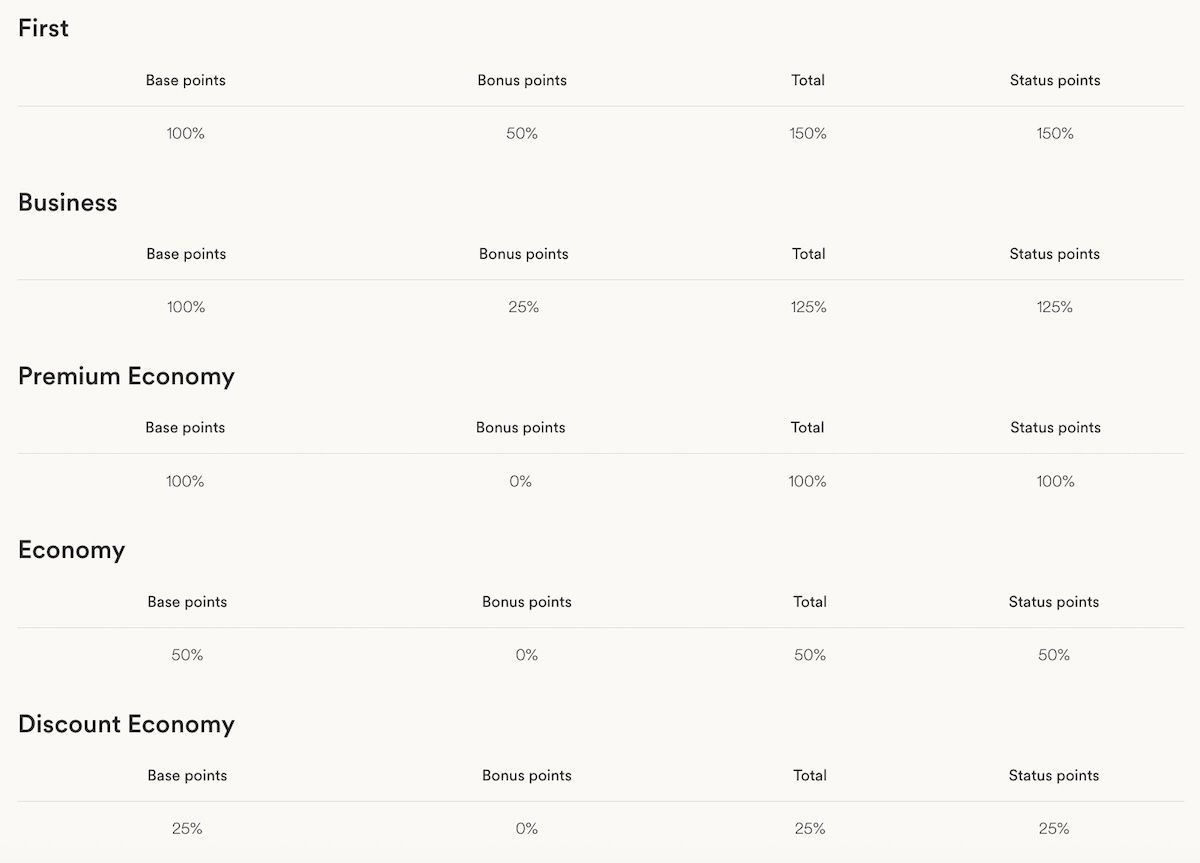
If you booked a reasonably priced domestic business class ticket on American as an Atmos Rewards Platinum member, you’d earn status points equal to 125% of the distance flown, and redeemable points equal to 225% of the distance flown. So that’s not horrible but also not great.
Let me emphasize that if you primarily earn AAdvantage elite status through flying American on revenue tickets, switching to Atmos Rewards probably isn’t the best strategy.
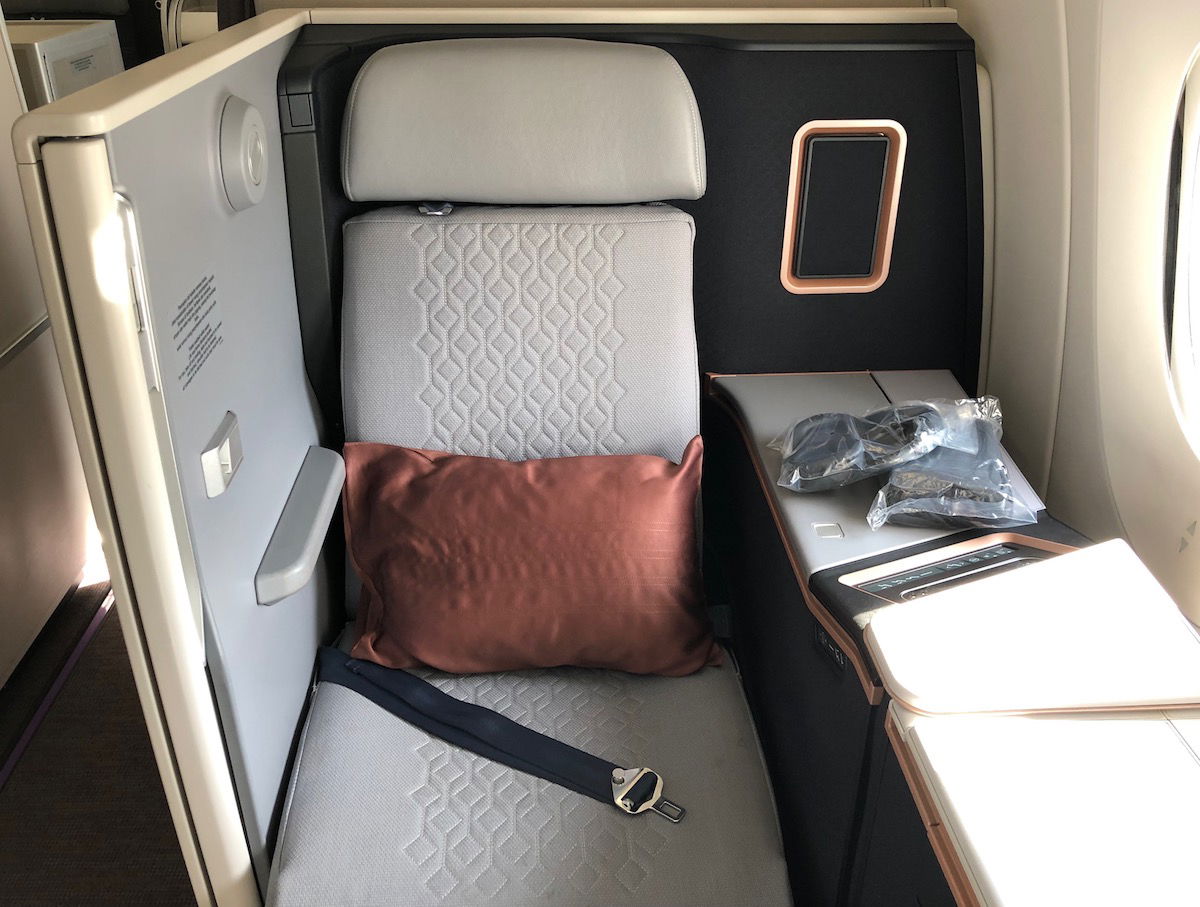
Atmos Rewards Platinum vs. Titanium status
Ultimately, Atmos Rewards Platinum status does the trick for me, since it earns oneworld Emerald. However, even without flying on Alaska much, I think there could be merit to pursuing top tier Atmos Rewards Titanium status. This require 135,000 status points, so that’s 55,000 more points than Platinum.
The coolest aspect of this perk is that you receive unlimited global day of departure upgrades on Alaska and Hawaiian, which we’ve never seen an airline offer before. But even forgetting about that, let’s talk about the other reason this could make sense.
Atmos Rewards has the milestone perks program, whereby you can select certain perks for passing various thresholds. For example, if you were to qualify for top tier status, you could select a total of an additional 88,250 redeemable points as a reward (50,000 of those points are offered specifically for earning Titanium, and the remaining points are offered at lower thresholds).
That potentially moves the needle quite a bit in terms of whether it’s worth putting additional spending on a co-branded Alaska card.
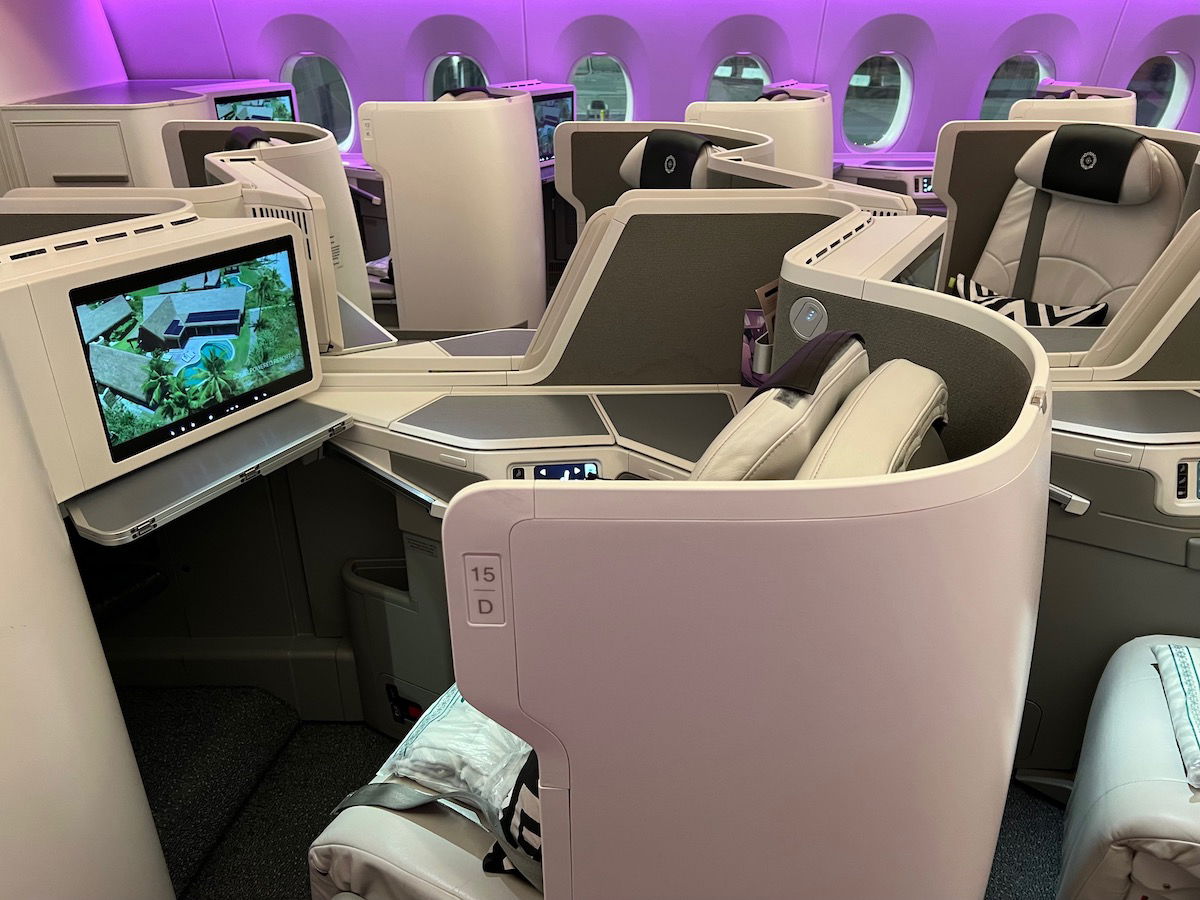
Downsides of Atmos Rewards for American flyers
If you’re planning to fly American more than Alaska, what are the downsides to pursuing elite status with Atmos Rewards instead of American AAdvantage? Keep in mind that Alaska and American both belong to oneworld (which standardizes some benefits), and the two airlines also have a special partnership offering reciprocal upgrades, both to extra legroom seating and to first class. With that in mind, a few thoughts…
Personally I don’t value upgrades that much since they typically don’t clear, but Atmos Rewards members are prioritized behind the equivalent tier at American. This means that an Atmos Rewards Platinum member would clear an upgrade behind an AAdvantage Platinum Pro member, but before an AAdvantage Platinum member.
Furthermore, there’s no denying that there’s some better treatment for “native” elite members of a frequent flyer program, rather than partner elites. Atmos Rewards elite members don’t get access to a priority phone line with American, so in the case of irregular operations, you might be better off as an elite with American.
It’s also worth acknowledging that if you credit American flights to Atmos Rewards, those wouldn’t count toward million miler lifetime elite status with either program. Then again, I don’t think that’s worth going out of your way to pursue either.
Honestly, what annoys me most about booking American flights without having my AAdvantage number on them is how hard it is to manage those reservations through aa.com or the mobile app. They really don’t make it easy, and that’s a headache. Then again, I’m already dealing with that when redeeming Atmos Rewards points on American, so that would just be more of the same.
So of course there are some mild downsides. But if you ask me, being able to earn oneworld Emerald with virtually no opportunity cost on credit card spending (at least in my situation) is a major upside. If American started awarding some sort of elite qualification for award flights (as Delta and United do), I might be a bit less certain about the switch.
But as things currently stand, how do I justify not making the switch? Airlines have made all kinds of changes to their programs over the years, and broadly speaking, it’s just not worth going out of your way to earn status anymore, in my opinion. So if I can earn status with no opportunity cost, that seems like a deal that’s tough to beat.
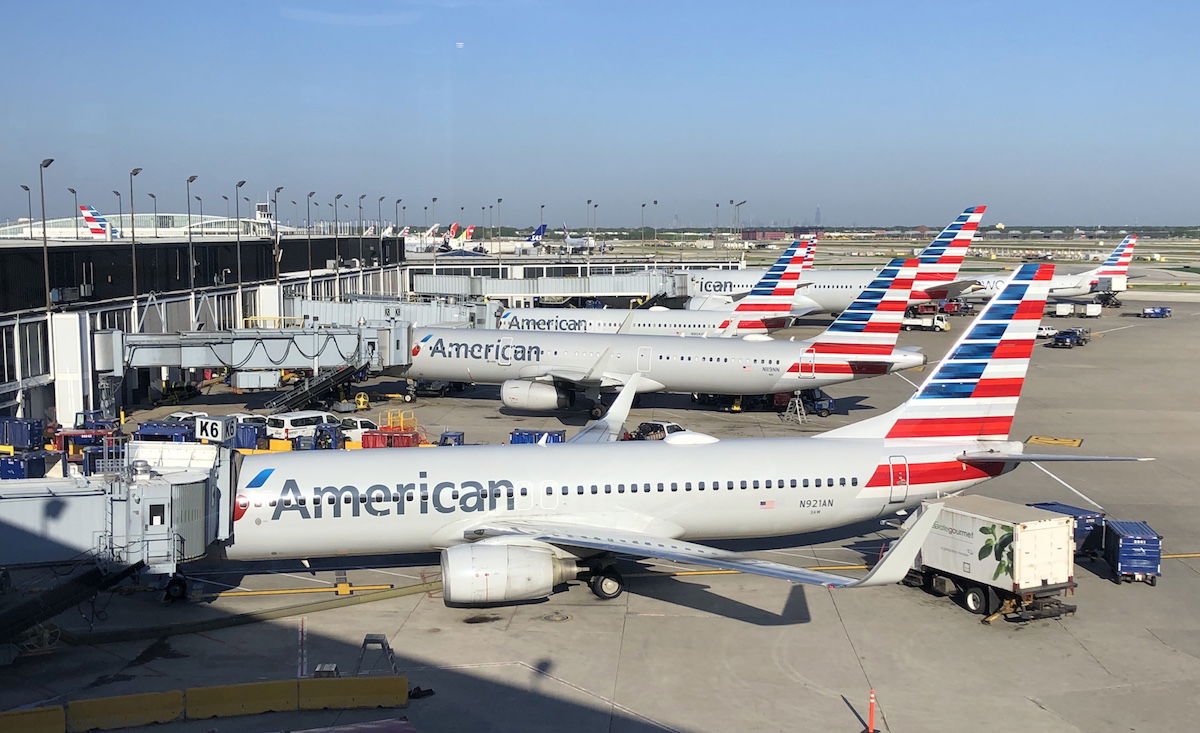
Bottom line
Alaska has launched its new Atmos Rewards program, and I’d argue that it’s something special. As someone who tries to only earn elite status if the math makes sense, I think this is the ultimately program for maximizers.
Between being able to efficiently earn elite status through credit card spending with the Atmos Summit Card (due to the rewards structure, Global Companion Award with spending, and Bilt possibilities), plus earning status points on award flights, I have a hard time rationalizing why I wouldn’t make the switch.
What do you guys think — should I make the switch from AAdvantage to Atmos Rewards? Anyone else in a similar boat, considering this strategy?





I know this is kind of old but curious if you know the answer... I don't have status with either AA or Alaska but I do have both the Summit and AA Plat (and biz) cards. If I book an AA flight with Atmos points and credit it to my Atmos account, will I get preferred boarding and free baggage on the AA flight?
Tanks!
Have you tried to book at international award on alaska…their reward chart is an exercise in fantasy…..almost all awards price at 2.5-3x lowest possible/have flown alaska a lot and had lots of glitches and delays despite their reputation/sevice from west coast to costa rica particularly bad featuring red eye flights and aurcraft that barely have the range to make ii
I have flown AA one segment in my life and it was miserable. However the last two years have earned executive platinum, then platinum pro, through spend. It was easy when blue apron subscriptions were 5,000 points and could be stacked. I still have wine from wine clubs.
I live in Seattle so I do fly Alaska a lot. I liked being able to book premium economy at booking, not hope to be upgraded....
I have flown AA one segment in my life and it was miserable. However the last two years have earned executive platinum, then platinum pro, through spend. It was easy when blue apron subscriptions were 5,000 points and could be stacked. I still have wine from wine clubs.
I live in Seattle so I do fly Alaska a lot. I liked being able to book premium economy at booking, not hope to be upgraded. I also wonder if the spend route might be easier through American given the loyalty points being multiplied through the shopping portal and a couple cheap nights in Vietnam (Iykyk).
It looks like on Alaska/Atmos it is one Status pint per 2 dollars and portal shopping only gives you extra miles not status points. I also might not even get bumped to premium economy. Am I missing something? (I do value the 100,000 point certificate).
In 2026, Alaska will make us pick between miles / dollars / segments to earn points... do we know how AA or other partners will fit into that?
I agree that earning Atmos based on AA-booked flights (not available on alaskaair.com) is awful, and I'm usually only getting 25-50% of the miles flown. But if I switched to earning based on dollars (5 pts per $) in 2026, it could make sense... depending on whether...
In 2026, Alaska will make us pick between miles / dollars / segments to earn points... do we know how AA or other partners will fit into that?
I agree that earning Atmos based on AA-booked flights (not available on alaskaair.com) is awful, and I'm usually only getting 25-50% of the miles flown. But if I switched to earning based on dollars (5 pts per $) in 2026, it could make sense... depending on whether partner flights also earn 5 points per dollar, or if it's a fraction thereof.
I’m a bit late to the post but as someone who made this switch from AA platinum pro to Alaska Airlines MVP 75K last year, I wanted to point out a counter point. While it’s nice that all of Alaska’s customer service team is based in the US, their technology and their ability to do anything outside of what you can do yourself is incredibly limited. When issues or non-basic awards come up with AA,...
I’m a bit late to the post but as someone who made this switch from AA platinum pro to Alaska Airlines MVP 75K last year, I wanted to point out a counter point. While it’s nice that all of Alaska’s customer service team is based in the US, their technology and their ability to do anything outside of what you can do yourself is incredibly limited. When issues or non-basic awards come up with AA, they are pretty great at working with partners or combining difficult routings. Alaska, still struggles to put together a One World award ticket with their own metal. And if you are a family or fly often with friends, Alaska can’t even split a record to allow you to snag two premium seats or go on the upgrade list while keeping the rest of your party a preferred seat. I’m already on team Atmos, but their customer service and their inability to do anything outside of what you can do yourself online is definitely a downside compared to what I was used to with AA.
Need a comparison of AA Hotels versus Rocketmiles w/ Atmos. Here's what I just compared, please let me know if I got anything wrong.
As best as I can tell, you get 1,000 status points for every 3,000 points earned with partners with Atmos.
As an example, I'm currently in Asakusa, Tokyo. The highest points earning hotel nearby for a 2 night stay Aug 29-31 is Asakusa View. 10k points w/ Atmos Rocketmiles (so that's...
Need a comparison of AA Hotels versus Rocketmiles w/ Atmos. Here's what I just compared, please let me know if I got anything wrong.
As best as I can tell, you get 1,000 status points for every 3,000 points earned with partners with Atmos.
As an example, I'm currently in Asakusa, Tokyo. The highest points earning hotel nearby for a 2 night stay Aug 29-31 is Asakusa View. 10k points w/ Atmos Rocketmiles (so that's 3,333 status points). Or 9,900 points with AA Hotels, or if you're in the 30% bonus, that's 12,870 LP.
Hotel for 2 nights is same price - $746. With AA Exec Card you get 1x LP and 10x miles. So total that's 17,360 miles and 13,616 LP. With Atmos Summit it's 373 status points and 746 miles. So total that's 3,706 status points and 10,746 miles.
AA Exec gives you 20k LP bonus and Atmos Summit 10k status point bonus.
PPro w/ AA is 125k points and Atmos Plat is 80,000 points in 2026. So net you need 105k or 70k to AAPPro/ASPlat. Yes AA exec is $200 more a year.
But- that one hotel transaction gets you 12.9% of the way to status with AA or 5.3% of the way to status with Alaska (#LP/105k or #StatPoints/70k). And 6,614 more miles with AA (and can value AA/AS miles the same or differently of course). If you value both at 1.5c a mile, that's a $100 difference in miles earned alone.
Just one example. YMMV - especially if you have 60k of natural foreign spend every year and opportunity cost is different. But if you use AA Hotels + AA Exec, it's still an incredibly powerful status and miles earning combo that I do not believe the new Atmos program has topped.
If you earn status via Atmos do you still have the issue that oneworld Emerald doesn't get you Flagship lounge access in the US? I have status through BA and keep it just for that benefit, but it's getting more annoying and I'd love to find another way. (side note, it's not to bad to manage flights on the aa app even with my BA number - I enter the confirmation number once and then it's always saved even though I'm going in as a guess)
The new Atmos program is exactly what I have been waiting for. Ben, you're spot on. I gave up on AA earned status after they put the emphasis on credit card spend and basically said they don't care about the loyal elites. If AA would have been smart, and listened to the road warriors, they would have kept a lot of happy elites. My approach these days is just buy the cheapest premium cabins, enjoy...
The new Atmos program is exactly what I have been waiting for. Ben, you're spot on. I gave up on AA earned status after they put the emphasis on credit card spend and basically said they don't care about the loyal elites. If AA would have been smart, and listened to the road warriors, they would have kept a lot of happy elites. My approach these days is just buy the cheapest premium cabins, enjoy the flight, and no strings attached. Very sAAd to see how AA destroyed loyalty.
Unfortunately, it looks like the math for those of us who fly AA economy booked through AA won't work. So, I imagine the hub-captive business fliers who aren't allowed domestic first fares will have to stay on AA hamster wheel, unless I'm missing something.
I didn't move from Alaska when moving from an AS hub to an AA hub. The partner earning chart for Alaska became awful this year, it used to be better. But even that didn't discourage me from keeping my AA flights with Alaska. Now that ThankYou points became transferrable, I was tempted to move to AA, but Summit launched and I changed my mind.
Love your articles. Was very intrigued by the 3x atmos points paying 3% fee for rent via Bilt. Wondering if you know if there is any creative way to pay my mortgage via this method and somehow calling it rent.
@ Michael -- Unfortunately not that I know of. Bilt is reportedly planning on soon allowing mortgage payments by card, though we don't know what that will look like, and if there will be a special opportunity with Atmos Rewards co-brand cards.
It's possible, some people have had success with it, but that's explicitly forbidden by BILT's contract and can get you banned or worse.
I've been top end elite with both Alaska and American Airlines. For me, the win that American offers are the global Upgrade Certificates. I know a lot of of people might not value them, but in a typical year I can successfully use 4 to 6 of them on international itineraries; including long haul - that is some real value. Ben, my guess is you don't value flying American that much and the global upgrade certificates don't offer you a lot of value.
Ben, I have had no trouble pulling up my flights (the AA ones credited to Atmos) on the AA iPhone app. Just search by name and AA PNR (not AS PNR) when signed in to your AA account. They will stick in your app until flight time just as any AA flight would.
That's true (in my case, flights on AA booked via BA as codeshares or awards) - you can see them in the app, but you don't have access to the same options to manage the booking that you do as a native AA booking (like choosing meals on international business class, for example) - I think that's what Ben is referring to
Ben, I sense what you're really after and Alaska is your path of least resistance.
Ben, let me help you with your decision. Stay with AA. We have enough elites at AS. The new 135,000 status point requirement for titanium is to help reduce the size of the herds. Please, Ben, stay with AA. Thank you.
An Atmos elite who is typically flying AA out of Miami/Dallas/Charlotte/Chicago has very little overlap with the typical Atmos elite who is flying Alaska out of Seattle/Portland/Anchorage/San Diego. It won't impact you.
Major issue that you did not call out on this article, which is honestly the biggest problem for me, and a major pitfall of the Atmos ecosystem.
Massively reduced EQM (now status points) on partner business class, when not booked via Alaska. You get maybe half the amount, and booking via Alaska isn't optimal.
You don't get access to the same fare buckets or itineraries, when booking via Alaska, so you get worse flight options...
Major issue that you did not call out on this article, which is honestly the biggest problem for me, and a major pitfall of the Atmos ecosystem.
Massively reduced EQM (now status points) on partner business class, when not booked via Alaska. You get maybe half the amount, and booking via Alaska isn't optimal.
You don't get access to the same fare buckets or itineraries, when booking via Alaska, so you get worse flight options for higher costs. It's a no-go for me for this exact reason.
In contrast, AA has very good loyalty point bonuses for JAL, and makes it very lucrative to status run w/ JAL for that reason.
@Ben, Living on the West Coast makes it easy for AS to be my primary carrier, and next week, I'll make MVP Gold 75k/Atmos Platinum (oneworld Emerald) for the first time. A few thoughts: 1) IF one books a flight through the AS website, even if it's on another carrier, 1 mile flown = 1 point just as if you were flying on AS metal. For example, I recently had to fly to PWM and...
@Ben, Living on the West Coast makes it easy for AS to be my primary carrier, and next week, I'll make MVP Gold 75k/Atmos Platinum (oneworld Emerald) for the first time. A few thoughts: 1) IF one books a flight through the AS website, even if it's on another carrier, 1 mile flown = 1 point just as if you were flying on AS metal. For example, I recently had to fly to PWM and back. My return flight (PWM-DCA on AA; DCA-SFO on AS) was "1 mile flown = 1 point." However, I couldn't book my flight to PWM via AS; I had to go to the AA website to do it. That reduced my miles, which depends upon the Fare Class of the ticket. In other words, sometimes I can fly AA through the AS website; sometimes I can't.
2) I don't want to jinx this, but as MVP Gold (now Atmos Gold) on AS, my upgrades to First have cleared so far this year on 10 out of 17 flights. On American, I'm 0 for 5.
3) As I understand it, for 2026, you have to choose whether you want "1 mile = 1 point" OR "5 points per $1 spent" -- the former being better for more long-haul transcontinental flights; the latter being better for those buying seats in F or doing lots of last minute travel. I'll be choosing the former. The points earned on credit card spend also count so, yes, that's another source.
Ben, there is a lot of information still missing from official communications. According to Crankyflier and Anteater on FT, 2 reliable inside sources, they are eliminating Class of Service bonus which would be extremely relevant. Making a decision now to switch or advocating for that without complete picture is irresponsible and inadvisable.
Elimination of CoS would immediatley have negative impact on me and how I book my flights. I'm currently ATMOS Titanium. I fly a few long hauls each year and make dozens of flights up and down the coast, so I am going to choose distance next year. I pay for FC often but just to get extra Elite Qualifying Miles and have flights booked all the way to June of 2026. On the routes I...
Elimination of CoS would immediatley have negative impact on me and how I book my flights. I'm currently ATMOS Titanium. I fly a few long hauls each year and make dozens of flights up and down the coast, so I am going to choose distance next year. I pay for FC often but just to get extra Elite Qualifying Miles and have flights booked all the way to June of 2026. On the routes I fly, I get upgraded to FC over 90% of the time. If I'm not going to get CoS bonus, I absolutely have no reason to pay for FC and will be changing all my paid FC to main cabin flights and get hundreds of $ of credit for future flights.
I decided to attempt Atmos Silver this year with a combo of award travel, a small amount of paid travel on AS, and CC spend on the now Atmos Ascent card. Now that the Summit card is out, I should get there no problem.
Next year, I'm going to attempt Atmos Gold status. I should be able to knock out $30k of spending between Bilt rent (actually HOA) payments and a one-time charge I make...
I decided to attempt Atmos Silver this year with a combo of award travel, a small amount of paid travel on AS, and CC spend on the now Atmos Ascent card. Now that the Summit card is out, I should get there no problem.
Next year, I'm going to attempt Atmos Gold status. I should be able to knock out $30k of spending between Bilt rent (actually HOA) payments and a one-time charge I make every year, so I'd need to get 25k status points via card spend and travel. I think that should be pretty doable for me. If my spending patterns hold, I will shoot for the $60k of Summit spend and the 100k companion award.
Something to consider now that AA is a transfer partner of Citi is that you can earn Citi Thank You points (with decent multipliers) and transfer those to top up your AA account in a way you cannot do with Atmos with any credit card points currency.
Bilt transfers to Atmos
How close are you to 4MM lifetime with AA though? Could you achieve it in 10 years?
@ stvr -- I'm at around 1.5 million at the moment. I enjoy flying as many airlines as possible, and so much of my American flying is on award flights anyway, so I'm not making great progress there.
"This means that an Atmos Rewards Titanium member would clear an upgrade behind an AAdvantage Executive Platinum member, but before an AAdvantage Platinum Pro member."
According to this guy, a Titanium member would clear after all the Plat Pros have cleared: https://onemileatatime.com/guides/american-alaska-reciprocal-upgrades/
;)
@ digital_notmad -- Hah, whoops, good catch. Just updated that, thank you!
Not crediting to AA too painful while first earning AS status, at least for those who book economy. Might make sense for someone who only books award and paid first. As an EP - upgrades, 11x miles earnings, and SDFC too much to sacrifice.
Also, flagship LAX instead of Qantas F lounge would be painful on a longhaul redemption.
With the (“sort of” :p) devaluation of AA miles, perhaps it’s time to revalue AS miles to show they’re truly king.
@ Sel, D. -- All fair if you do a lot of revenue flying on American. But why not Qantas First Lounge LAX with Atmos Rewards? You can still get oneworld Emerald.
While crediting to Atmos *before* you earn emerald? Perhaps they would let you in with your AA number without crediting the flight to AA?
@ Sel, D. -- Oh, I see what you're saying. Well, I currently don't have oneworld Emerald with any airline, so at least for me, that's not a factor.
Matt's Planet on Youtube has a pretty good guide to crediting to one Oneworld airline while accessing the lounge with another Oneworld status (lots of BA Gold folks going through this right now).
My biggest issue with Atmos rewards is that depending on the dates of travel (especially during peak / holiday periods) - AS mileage redemptions on AA metal can be really really limited (or nonexistent)
@ Bill C -- For sure, if you value non-saver award space or other mileage deals through AAdvantage, the math isn't as obvious.
Yes, but "non-saver award space" on American can be just 1k more points.
For example, the saver price for JFK SNA is 13k miles, and at that level you could book the flight through Oneworld partners. But often the flight is priced in the range of 14k-18k, which isn't bad. You just book, and check daily to see if the price goes down.
I was able to score AA MIA-LGA F last year for 12k AS miles for Memorial Day. But I agree that redeeming AA is harder than other Alaska partners.